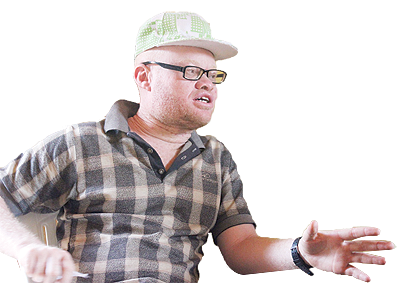FOLLOWING the killings of albinos in Uganda and Tanzania, The Telegraph newspaper reported that over 57 murders and around 14 attempted murders have so far been recorded in Tanzania. Their body parts, which have been the major cause of their death, are being cut off and sold at about $2,000 a piece for purposes of witchcraft.


FOLLOWING the killings of albinos in Uganda and Tanzania, The Telegraph newspaper reported that over 57 murders and around 14 attempted murders have so far been recorded in Tanzania. Their body parts, which have been the major cause of their death, are being cut off and sold at about $2,000 a piece for purposes of witchcraft. Watching this great tragedy unfold, Marie-Clementine Dusabejambo, an engineer by training and filmmaker, vowed not to let this murderous phenomenon cross into her own country. In January last year, she started to research the lives of albinos and the way they related to the rest of society. "Luckily in Rwanda the major problem albinos face isn’t murder but segregation from ‘normal’ children, both in school and home.” Dusabejambo said. "People think being an albino restrains you from doing a lot of things. They think you can’t be bright in class, you can’t be good at sports and many more negative things”. "Yet we are just the same; we have the same capabilities but just in a different colour,” Theodore Teo Iraduha, head of the Albino Association, retorts.Dusabejambo then thought of an initiative that would sensitise the Rwandan public that albinos are normal people and have the same capabilities as others. She launched the Black in White Initiative for Peace, with the moto ‘All flowers of all colours together make the beauty of nature.’On April 4, Dusabejambo, in collaboration with Peace and Love Proclaimers, Basic Briliant Africa, Peace for Life and Almond Tree Films came together to organise and launch a campaign to shed light on the challenges and struggles faced by the albinos in Rwanda, putting together a platform for albinos to share in public their opinion about their life and how it can be improved.The lives of albinos were showcased even more with a four minute documentary that was put together by Dusabejambo. The short film showed how albinos are segregated against in Rwanda.The launch took place at the Kigali Serena Hotel and was attended by the Minister of Youth and ICT, Philbert Nsengimana, among other officials and dignitaries."This initiative was a wake up call to all Rwandans to foster peace and development and learn from mistakes of other countries in order to prevent them from occurring in our country,” Minister Nsegimana said. The Minister pledged Rwf 2 million to the Albino Association.Albinos said they felt very supported and relieved in their country following the unfortunate tragedies that had occurred to their counterparts in neighbouring countries."It was a pleasure to launch the Black in White Initiative. We had for so long wished to have it in place. I am very glad people came to support us, we now believe that we are valued in our country,” Theodore Teo Iraduha said. The initiative has been a great benefit to the lives of albinos. "People now know that albinos are normal just like others and contribute towards development of our country. I am completing an accounting and finance course and I am good at karate. I am among the best in my class,” Valentine Irakoze, an albino that studies at the Kigali-based School of Finance and Banking said.There are no differences between albinos and everyone else – they have the same beginnings, thoughts and feelings as anyone else. There are just a few differences, which aren’t worth separating, stigmatising or segregating people for.Dusabejambo who has had a lot of experience with short film making was also the second editor in "I want to see the movie,” a documentary based on the making of a feature film "Kinyarwanda” by Alrick Brown. Based on these experiences, she created her first short-film called "Lyiza” in 2012. Lyiza is a short film about a young school child dealing with fears and memories from the 1994 Genocide against the Tusti. Her hard work paid off when LYIZA premiered at the Tribeca Film Festival 2011 in New York and in Yaoundé during the International Festival of Women’s Films. In 2012, the jury unanimously awarded the prize of the cineforum at the African, Asian and Latin American Film Festival to the film "Lyiza” Dusabejambo has used a lot of what she has learnt in making films that have had an impact on the lives of many Rwandans today.What is albinism?Albinism (from Latin albus, "white”) is a congenital disorder characterised by the complete or partial absence of pigment in the skin, hair and eyes due to absence or defect of an enzyme involved in the production of melanin. Albinism results from inheritance of recessive gene alleles and is known to affect all vertebrates. In humans, there are two principal types of albinism, oculocutaneous, affecting the eyes, skin and hair, and ocular affecting the eyes only.Most oculocutaenous albinistic humans appear white or very pale as the melanin pigments responsible for brown, black, and some yellow colorations are not present. Ocular albinism results in pale blue eyes, and may require genetic testing to diagnose.Because individuals with albinism have skin that entirely lacks the dark pigment melanin, which helps protect the skin from the sun’s ultraviolet radiation, their skin can burn more easily from overexposure.


